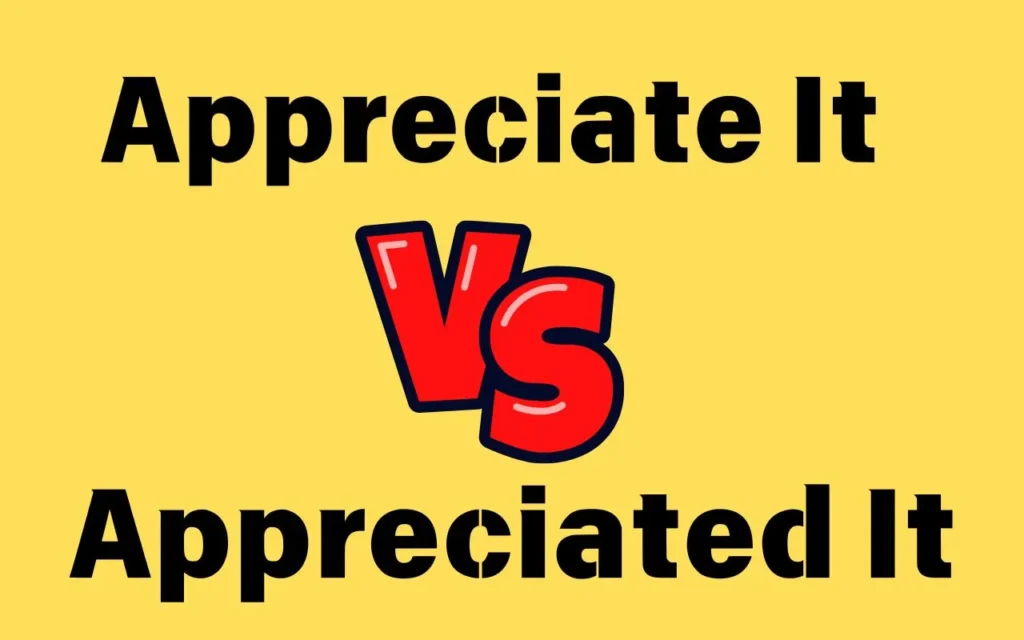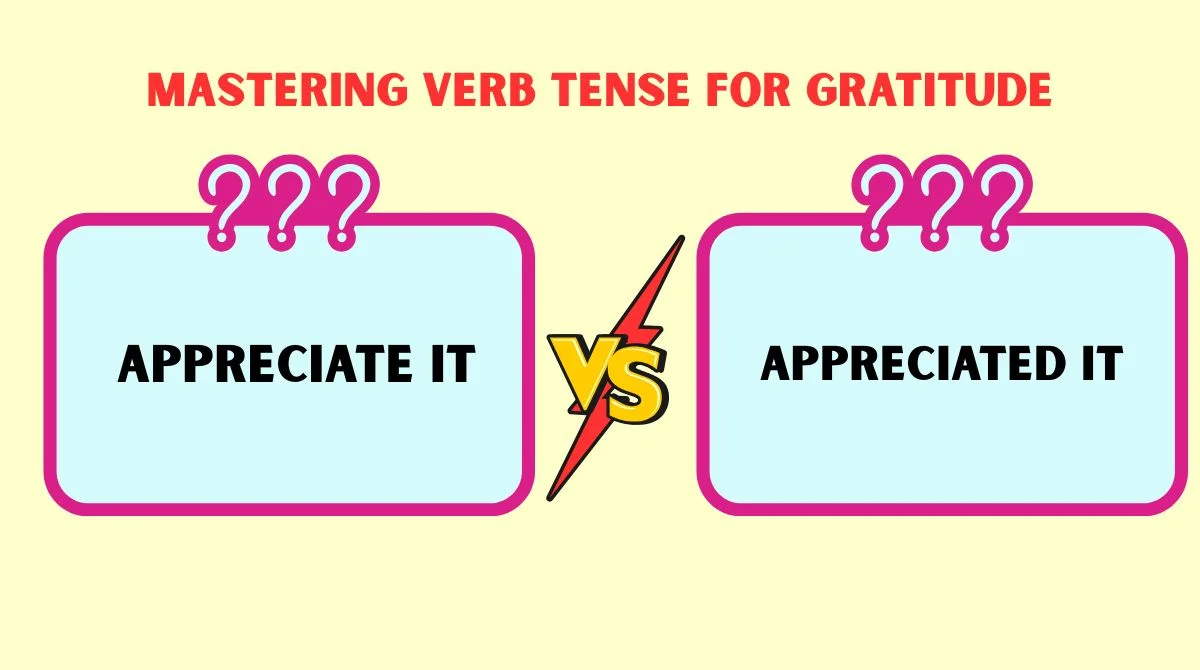Last updated on September 23rd, 2025 at 08:37 am
Language often comes with its fair share of confusing phrases, and figuring out whether to say appreciate it or appreciated it can leave even native speakers scratching their heads.
Both phrases are correct, but their usage depends on the context, especially in terms of verb tense.
This comprehensive guide will explore their differences, helping you understand when and how to use them effectively.
Understanding ‘Appreciate It’ in American English

The phrase appreciate it is commonly used in American English to express gratitude or acknowledge something in the present moment.
Is it “appreciate it” or “appreciated it”? Discover how verb tense affects their meanings and learn the right context for using each phrase.
It’s a polite, conversational way to show thankfulness, often heard in everyday situations.
What Does It Mean?
When someone says I appreciate it, they’re conveying their gratitude for something happening or being done at that moment. It reflects immediate or ongoing acknowledgment.
The Present Tense Use of ‘Appreciate’
The verb appreciate in the present tense highlights a current state of gratitude. It’s typically used with “it” to refer to a specific act, favor, or gesture.
Key Characteristics:
- Tense: Present simple
- Usage: To express gratitude or value for something happening now or in general.
Examples:
- “Thanks for helping me with this project—I really appreciate it.”
- “I appreciate it when you take the time to explain things clearly.”
Notice how these examples emphasize something ongoing or relevant in the present moment.
Examples of ‘Appreciate It’ in Everyday Conversations
You’ll often hear appreciate it in casual conversations, whether at work, with friends, or even in customer service settings. Here are some scenarios:
- At Work:
“Could you send me that report by tomorrow? I’d really appreciate it.” - With Friends:
“Thanks for picking up the tab last night—I appreciate it.” - In Customer Service:
“Thank you for calling to resolve the issue. I appreciate it!”
Key point: In each example, the gratitude refers to something happening in the present or future.
The Past Tense Nuance of ‘Appreciated It’
In contrast, appreciated it is used to express gratitude for something that happened in the past. It’s the past tense of appreciate, which means it’s used when the act or gesture being referred to is no longer ongoing.
When Is It Used?
You use appreciated it to acknowledge an act of kindness, help, or consideration that has already occurred.
Grammar Deep-Dive: When to Use ‘Appreciate It’
To determine whether to use appreciate it, consider the time frame of the action. Is the act ongoing or about to happen? If yes, appreciate it is the correct choice.
Grammar Breakdown:
- Verb Tense: Present
- Usage: Describes immediate or upcoming gratitude.
Examples:
- Correct: “I appreciate it if you could reply by tomorrow.”
- Incorrect: “I appreciated it if you could reply by tomorrow.” (Mixing tenses creates confusion.)
Tip: Remember, appreciate it is rooted in present or future time frames.
Exploring ‘Appreciated It’ in Past Scenarios
Appreciated it, on the other hand, reflects gratitude for a completed act. It’s perfect for acknowledging something that has already occurred.
Grammar Breakdown:
- Verb Tense: Past
- Usage: Refers to a specific instance in the past.
Examples:
- “I appreciated it when you helped me move last weekend.”
- “Thanks for explaining the process earlier—I really appreciated it.”
In both examples, the gratitude is tied to a past action.
‘Appreciate It’ vs. ‘Appreciated It’: The Contextual Difference
The key difference between appreciate it and appreciated it lies in the verb tense. Let’s summarize the differences in a simple table:
| Phrase | Tense | Usage | Example |
|---|---|---|---|
| Appreciate it | Present | Gratitude for something now or upcoming | “Thanks for your help—I really appreciate it.” |
| Appreciated it | Past | Gratitude for something in the past | “I appreciated it when you helped me last week.” |
Key Takeaway: Use the tense to align with the time frame of the action being acknowledged.
Determining the Appropriate Usage Through Context
To choose the correct phrase, ask yourself two questions:
- Is the gratitude for something happening now or soon? (Use appreciate it.)
- Is the gratitude for something that happened in the past? (Use appreciated it.)
Understanding context is essential to avoid mistakes.
Conveying Gratitude: Which Phrase to Choose?
Sometimes, subtle context clues can help you decide. Consider these scenarios:
- Scenario 1: Someone helps you carry groceries to your car.
- “I appreciate it.” (Happening in the moment)
- Scenario 2: A friend helped you plan a surprise party last week.
- “I appreciated it.” (Referring to a completed act)
Real-world Examples of ‘Appreciate It’ and ‘Appreciated It’
Examples of Appreciate It:
- “I appreciate it if you can help me finish this task by today.”
- “Thanks for your advice—I really appreciate it.”
Examples of Appreciated It:
- “I appreciated it when you explained that complicated topic last class.”
- “The team appreciated it when you stayed late to finish the presentation.”
How Native Speakers Use These Phrases
Native English speakers often rely on these phrases in informal and formal contexts. You’ll notice that appreciate it is more common because it’s frequently used to show present or general gratitude.
Observation:
- Appreciate it is often paired with polite qualifiers like “really” or “so much.”
- Example: “I really appreciate it when you’re honest with me.”
- Appreciated it is commonly paired with time references like “when” or “earlier.”
- Example: “I appreciated it earlier when you explained the process clearly.”
Tips to Remember the Correct Use of ‘Appreciate’ and ‘Appreciated’
Here are some tips to avoid confusion:
- Focus on the Time Frame:
- Present or future? Use appreciate it.
- Past? Use appreciated it.
- Look for Context Clues:
- Words like “now,” “today,” or “soon” signal appreciate it.
- Words like “yesterday,” “last week,” or “earlier” signal appreciated it.
- Practice with Examples:
- Write your own sentences using each phrase to solidify your understanding.
- Listen to Native Speakers:
- Pay attention to how these phrases are used in movies, podcasts, or conversations.
FAQs
What’s the difference between “appreciate it” and “appreciated it”?
“Appreciate it” is in the present tense, expressing gratitude for something happening now or in the future. “Appreciated it” is in the past tense, referring to gratitude for a completed action.
When should I use “appreciate it”?
Use “appreciate it” to express gratitude for something that’s currently happening or about to happen. For example, “I appreciate it if you could assist me with this task.”
Is “appreciated it” grammatically correct?
Yes, “appreciated it” is correct when referring to gratitude for something that happened in the past. For example, “I appreciated it when you helped me last week.”
Can “appreciate it” be used in formal writing?
Yes, “appreciate it” is acceptable in formal and informal contexts. However, for formal settings, consider using “I greatly appreciate it” to enhance politeness.
How can I avoid confusing “appreciate it” with “appreciated it”?
Focus on the time frame: if the action is in the present or future, use “appreciate it.” If it’s in the past, go with “appreciated it.”
Conclusion
The choice between appreciate it and appreciated it boils down to verb tense and context.
Whether you’re expressing gratitude in the moment or reflecting on past kindness, knowing the difference ensures your communication is clear and accurate.
Gratitude is a universal language, so mastering these phrases will help you convey it effectively, no matter the situation. Keep practicing, and soon it’ll feel as natural as saying “thank you”!
